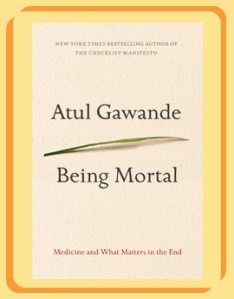Atul Gawande’s Being Mortal, is a sobering, and I think necessary, read for all of us. It is much more than its thumbnail reviews, much more than “make the most of your life now, tell your children how you want to live, how you want to die,” although those are important components of his message.
Rather it is a thoughtful presentation, made palpable with his use of real-life situations, of what it means to grow old (not “older” as we obliquely phrase it). He depicts in accurate, albeit disturbing, detail, the physical changes that, regardless of our vegan diets, our daily trips to the gym, all of us face or will face.
He describes our reliance on the medical-model, treating conditions which are, essentially, untreatable, and brings to bear the soul-searing reality of not only nursing homes, but also of those euphemistically named assisted-living facilities where the focus is safety and security, at the disturbing cost of freedom for those who are treated as helpless children. This is not to disparage those whose back-breaking work at these facilities care for those who require it. Rather, he points out that some who are housed there would benefit from a focus on maintaining independence.
Gawande asks us to consider just who it is who demands this security? For many, it is the children, those who want mom to be safe, forgetting that her newly-circumscribed life may not be what she wants. Perhaps she’d rather take her chances with a fall. Perhaps not. But, Gawande exhorts, ask, don’t assume.
Still, many of my cohort, as we grow older, fight aging and death with all our powers, when, certainly, death is the natural order of things. Rather than accepting that, we exhaust our psychic and physical resources to push that reality far from consciousness, energies that we could be using to savor our days, to appreciate, even relish, the simple pleasure of everyday routines, of companionship with people who accept us as we are.
The Buddhists hand us a lovely paradox – we live longer when we stop trying to live longer; we are more alive when we stop trying to be more alive.
And are we all not concerned for our legacy, especially as the time shortens for us to do that which we intended to do? Gawande suggests that the content of that legacy changes as we mature, that as we become less interested in achieving, we become more focused on being. Oh, those Buddhists.
And as for me, I do want to remain actively engaged with the world, enough that I will also enjoy those times when I retreat from the world. I want to keep my freedom and am willing to pay a price for that. I don’t want to be a burden; I’ve had “the talk” with my lovely daughter, who understands.
The medical-model wants to fix. For the aged, it is a battle that cannot be won. Gawande suggests that we direct our attention to the sustenance of our souls. And, for me, if I can figure out how to do it, it will be the focus of my future.

Your comments are spot on! Prior to reading the book, I was convinced that I was doing all the right things to ensure that my elderly Mother-in-law was safe and comfortable. Being Mortal prompted me to have a candid discussion with her and to ask for her definition of quality of life at 90. The answers were most surprising! I encourage all of us children who are caring for elderly parents to ask before assuming.
LikeLike